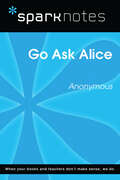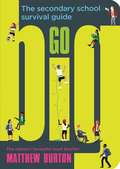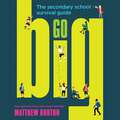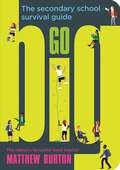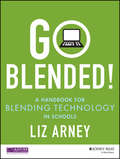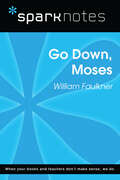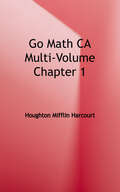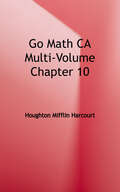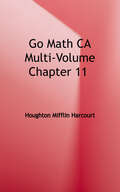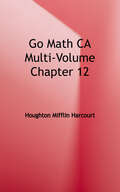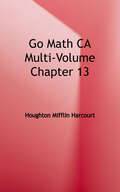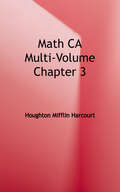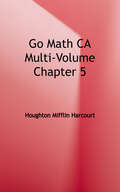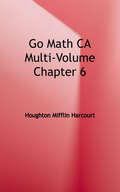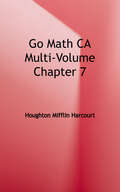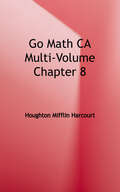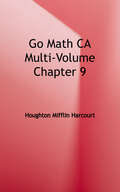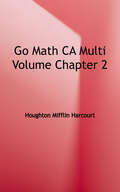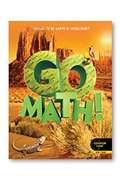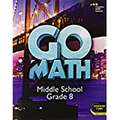- Table View
- List View
Gnys at Wrk: A Child Learns to Write and Read
by Glenda BissexWhen he was five and a half years old, Paul Bissex wrote and posted this sign over his workbench: DO NAT DSTRB GNYS AT WRK. The “work” from which this “genius” refused to be “disturbed” was the work typical of all children, namely, the task of learning how to write and read. In Gnys at Wrk, Glenda Bissex goes far beyond the chronicle of her son’s accomplishment to provide the first in-depth case study of a child’s confrontation with written language, rich in revelations about the nature and processes of the mind. <P><P>Paul begins by writing notes in a system of his own invention―like IEAVGAWNTOOTHESTOR for “I have gone to the store”―and this system becomes more elaborate as he goes on to create stories, games and signs. Eventually, the system merges with conventional written English as Paul learns to separate words and to associate letters not with their names but with sets of possible sounds. <P><P>Glenda Bissex shows how the evolution of Paul’s writing ability is closely intertwined with his reading development―in Paul’s own words, “once you can write a word you can read it.“ She also makes an intriguing comparison between Paul’s schoolwork and his endeavors at home, and explores the influence of his personal interests and world view on his facility with words. Her study is a unique, detailed account of the “genius” that is, quite simply, the human capacity for language.
Go Ask Alice (SparkNotes Literature Guide Series)
by SparkNotesGo Ask Alice (SparkNotes Literature Guide) Making the reading experience fun! Created by Harvard students for students everywhere, SparkNotes is a new breed of study guide: smarter, better, faster.Geared to what today's students need to know, SparkNotes provides:chapter-by-chapter analysis explanations of key themes, motifs, and symbols a review quiz and essay topics Lively and accessible, these guides are perfect for late-night studying and writing papers.
Go Away, Dog (My First I Can Read)
by Joan L NodsetA gentle and funny child's-eye view of overcoming doubts and meeting a new pet (or friend).At first the boy doesn't want to meet a friendly wagging dog at the park—"Go away, dog!" he says. But as the dog fetches, rolls over, shakes hands, and otherwise works all its doggy charms, the boy starts to open up. "You like me, don't you, you old dog?" Maybe they can be friends after all.This My First I Can Read uses simple, repeating words, making it a good match for the youngest emergent readers. The classic story is now accompanied by appealing modern full-color art by Paul Meisel.Go Away, Dog is a My First I Can Read book, which means it’s perfect for shared reading with a child. Books at this level feature basic language, word repetition, and whimsical illustrations, ideal for sharing with emergent readers. The active, engaging stories have appealing plots and lovable characters, encouraging children to continue their reading journey.
Go Big: The Secondary School Survival Guide
by Matthew Burton'If you have kids transitioning from primary to secondary school, this book is for you (well, for your kids!) ... Helpful, funny and encouraging' - Sarah Turner AKA The Unmumsy MumThe bestselling back to school handbook, from the nation's favourite head teacher, Mr Burton. Secondary school can seem scary. Corridors are wide, older students look terrifying and there's homework, messy friendships and stressful exams to deal with.But, whether you're about to land at secondary school or you're still settling in, Mr Burton is here to guide you through your journey - worry-free.From your first day to your final exams, this handbook will have you achieving, succeeding and being the best you can be. Find great friends, boost your confidence and start building toward your brilliant future.Written by head teacher and star of Educating Yorkshire, Mr Matthew Burton, this is the ultimate secondary school survival guide.
Go Big: The Secondary School Survival Guide
by Matthew BurtonFrom head teacher and star of Educating Yorkshire, Mr Matthew Burton, this is the ultimate secondary school survival guide.'Find great friends. Boost your confidence. Build towards your brilliant future.'Secondary school can seem scary. Corridors are wide, older students look terrifying and there's homework, messy friendships and stressful exams to deal with.But, whether you're about to land at secondary school or you're still settling in, Mr Burton is here to guide you through your journey - worry-free.From your first day to your final exams, this handbook will have you achieving, succeeding and being the best you can be!'If you have kids transitioning from primary to secondary school, this book is for you (well, for your kids!) ... Helpful, funny and encouraging' - Sarah Turner AKA The Unmumsy Mum(P)2020 Hodder & Stoughton Limited
Go Big: The Secondary School Survival Guide
by Matthew Burton'If you have kids transitioning from primary to secondary school, this book is for you (well, for your kids!) ... Helpful, funny and encouraging' - Sarah Turner AKA The Unmumsy MumTHE BESTSELLING SECONDARY SCHOOL HANDBOOK, FROM THE NATION'S FAVOURITE HEAD TEACHER, MR BURTON.Secondary school can seem scary. Corridors are wide, older students look terrifying and there's homework, messy friendships and stressful exams to deal with.But, whether you're about to land at secondary school or you're still settling in, Mr Burton is here to guide you through your journey - worry-free.From your first day to your final exams, this handbook will have you achieving, succeeding and being the best you can be. Find great friends, boost your confidence, work hard and start building toward your brilliant future.Written by head teacher and star of Educating Yorkshire, Mr Matthew Burton, this is the ultimate secondary school survival guide.
Go Big: The Secondary School Survival Guide
by Matthew Burton'If you have kids transitioning from primary to secondary school, this book is for you (well, for your kids!) ... Helpful, funny and encouraging' - Sarah Turner AKA The Unmumsy MumTHE BESTSELLING SECONDARY SCHOOL HANDBOOK, FROM THE NATION'S FAVOURITE HEAD TEACHER, MR BURTON.Secondary school can seem scary. Corridors are wide, older students look terrifying and there's homework, messy friendships and stressful exams to deal with.But, whether you're about to land at secondary school or you're still settling in, Mr Burton is here to guide you through your journey - worry-free.From your first day to your final exams, this handbook will have you achieving, succeeding and being the best you can be. Find great friends, boost your confidence, work hard and start building toward your brilliant future.Written by head teacher and star of Educating Yorkshire, Mr Matthew Burton, this is the ultimate secondary school survival guide.
Go Blended!
by Liz ArneyCraft a blended learning program tailor-made for your studentsGo Blended! is a practical implementation guide for educators interested in getting blended learning off the ground. Author Liz Arney is a seasoned developer of blended learning programs at Aspire Public Schools, and she also closely collaborates with district and charter leaders from across the country on this work. Go Blended! offers boots-on-the-ground support for laying the foundation for a blended learning program in our schools and classrooms. Throughout the book teachers with blended learning experience share helpful tips and lesson plans to help educators make purposeful choices in using technology to fulfill students' needs without becoming an end in itself. This useful guide also offers key documents and timelines to support a blended learning implementation and provides step-by-step practical advice for avoiding mistakes. Readers will gain expert insight into both the broad and narrow of blended transition, from sweeping concepts like program goals to nitty-gritty details like teaching routines around technology use.Technology is rapidly changing the landscape of education; teacher effectiveness and student achievement are both tied to the ability to adapt to new technology, and blended learning has become a hot topic in schools across the nation. Go Blended! helps school leaders and teachers take their first steps toward blended learning, putting them in a better position to continuously adapt as the world changes. You'll learn how to:Investigate leadership and staff readiness to "go blended."Learn how to evaluate and purchase the right educational software.Keep the program's goals in mind throughout the development process.Teach lessons that set students up for success when using classroom technology.Tailor the program to the students, not the other way around.Aspire's impressive track record of high performance, along with a growing body of evidence from blended schools across the nation, testifies to the reality that incorporating technology into the classroom can improve student outcomes. But improved student outcomes will only occur when teachers and administrators intentionally tailor technology and curricula to meet their goals. With Go Blended!, you can be confident that you're focused on the ultimate goal of blended learning: increasing student achievement.
Go Down, Moses (SparkNotes Literature Guide Series)
by SparkNotesGo Down, Moses (SparkNotes Literature Guide) by William Faulkner Making the reading experience fun! Created by Harvard students for students everywhere, SparkNotes is a new breed of study guide: smarter, better, faster.Geared to what today's students need to know, SparkNotes provides:chapter-by-chapter analysis explanations of key themes, motifs, and symbols a review quiz and essay topics Lively and accessible, these guides are perfect for late-night studying and writing papers.
Go Home, Goat (Bright Owl Books)
by Molly CoxeGoat is cold. He needs a home in the snow! This fun photographic easy-to-read story features the long "o" vowel sound. Kane Press's new series of super simple easy-to-reads, Bright Owl Books, adds Molly Coxe's five fun photographic long vowel stories, which are each only around 100–200 words. Molly Coxe's stories help kids learn to read by teaching the basic building blocks of reading—vowel sounds. With a note to parents and teachers at the beginning and story starters at the end, these books give kids the perfect start on educational success. Bright Owl Books make bright owl readers!
Go Long!
by Paul Mantell Tiki Barber Ronde BarberIt's Tiki and Ronde's second year on their junior high school football team, the Hidden Valley Eagles. The eighth-grade season is here, and the boys have come together as a team. Now key starters, Tiki and Ronde are ready for a great season, and with hard work and determination, maybe they will even go all the way to the State Championship! But when Coach Spangler announces that he has been asked to move up to the high school team, and Mr. Wheeler, the science teacher, is tapped for the head coaching job, the season seems over before it begins. Sure, Coach Wheeler played college football until he was benched by an injury, but it just isn't the same. Tiki wants to give Coach Wheeler a chance, yet the team's loyalties are divided. What does a science teacher know about the game of football? Can the team work together, get behind their new coach, and play smart? Inspired by the childhood of NFL superstars Tiki and Ronde Barber, Go Long! is a story of teamwork, perseverance, and what it takes to be a champion.
Go Math CA Multi-Volume Chapter 1
by Houghton Mifflin HarcourtCalifornia Go Math! Chapter 1 Place Value, Addition, and Subtraction to One Million In this chapter, you will explore and discover answers to the following Essential Questions: - How can you use place value to compare, add, subtract, and estimate with whole numbers? - How do you compare and order whole numbers? - What are some strategies you can use to round whole numbers? - How is adding 5- and 6-digit numbers similar to adding 3-digit numbers?
Go Math CA Multi-Volume Chapter 10
by Houghton Mifflin HarcourtCalifornia Go Math! Chapter 10 Two-Dimensional Figures In this chapter, you will explore and discover answers to the following Essential Questions: - How can you draw and identify lines and angles, and how can you classify shapes? - What are the building blocks of geometry? - How can you classify triangles and quadrilaterals? - How do you recognize symmetry in a polygon?
Go Math CA Multi-Volume Chapter 11
by Houghton Mifflin HarcourtCalifornia Go Math! Chapter 11 Angles In this chapter, you will explore and discover answers to the following Essential Questions: - How can you measure angles and solve problems involving angle measures? - How can you use fractions and degrees to understand angle measures? - How can you use a protractor to measure and classify angles? - How can equations help you find the measurement of an angle?
Go Math CA Multi-Volume Chapter 12
by Houghton Mifflin HarcourtCalifornia Go Math! Chapter 12 Relative Sizes of Measurement Units In this chapter, you will explore and discover answers to the following Essential Questions: - How can you use relative sizes of measurements to solve problems and to generate measurement tables that show a relationship? - How can you compare metric units of length, mass, or liquid volume? - How can you compare customary units of length, weight, or liquid volume?
Go Math CA Multi-Volume Chapter 13
by Houghton Mifflin HarcourtCalifornia Go Math! Chapter 13 Algebra: Perimeter and Area In this chapter, you will explore and discover answers to the following Essential Questions: - How can you use formulas for perimeter and area to solve problems? - How are area and perimeter different? - What are some methods you can use to find area and perimeter of a figure? - How could two different rectangles have the same perimeter or the same area?
Go Math CA Multi-Volume Chapter 3
by Houghton Mifflin HarcourtCalifornia Go Math! Chapter 3 Multiply by 2-Digit Numbers In this chapter, you will explore and discover answers to the following Essential Questions: - What strategies can you use to multiply 2-digit numbers? - How can you use place value to multiply 2-digit numbers? - How can you choose the best method to multiply 2-digit numbers?
Go Math CA Multi-Volume Chapter 5
by Houghton Mifflin HarcourtCalifornia Go Math! Chapter 5 Factors, Multiples and Patterns In this chapter, you will explore and discover answers to the following Essential Questions: - How can you find factors and multiples, and how can you generate and describe number patterns? - How can you use models or lists to find factors? - How can you create a number pattern?
Go Math CA Multi-Volume Chapter 6
by Houghton Mifflin HarcourtCalifornia Go Math! Chapter 6 Fraction Equivalence and Comparison In this chapter, you will explore and discover answers to the following Essential Questions: - What strategies can you use to compare fractions and write equivalent fractions? - What models can help you compare and order fractions? - How can you find equivalent fractions? - How can you solve problems that involve fractions?
Go Math CA Multi-Volume Chapter 7
by Houghton Mifflin HarcourtCalifornia Go Math! Chapter 7 Add and Subtract Fractions In this chapter, you will explore and discover answers to the following Essential Questions: - How do you add or subtract fractions that have the same denominator? - Why do you add or subtract the numerators and not the denominators? - Why do you rename mixed numbers when adding or subtracting fractions? - How do you know that your sum or difference is reasonable?
Go Math CA Multi-Volume Chapter 8
by Houghton Mifflin HarcourtCalifornia Go Math! Chapter 8 Multiply Fractions by Whole Numbers In this chapter, you will explore and discover answers to the following Essential Questions: - How do you multiply fractions by whole numbers? - How can you write a product of a whole number and a fraction as a product of a whole number and a unit fraction?
Go Math CA Multi-Volume Chapter 9
by Houghton Mifflin HarcourtCalifornia Go Math! Chapter 9 Relate Fractions and Decimals In this chapter, you will explore and discover answers to the following Essential Questions: - How can you record decimal notation for fractions and compare decimal fractions? - Why can you record tenths and hundredths as decimals and fractions? - What are some different models you can use to find equivalent fractions? - How can you compare decimal fractions?
Go Math! CA Multi Volume Chapter 2
by Houghton Mifflin HarcourtCalifornia Go Math! Chapter 2 Multiply by 1-Digit Numbers In this chapter, you will explore and discover answers to the following Essential Questions: - What strategies can you use to multiply by 1-digit numbers? - How can you use models to multiply a multi-digit number by a l-digit number? - How can you use estimation to check your answer? - How does the partial products strategy use place value?
Go Math! Grade 5
by Houghton Mifflin Harcourt Publishing Company StaffMath textbook for fifth graders.
Go Math!: Student Interactive Worktext Grade 8 2014 (Go Math! Ser.)
by Holt McdougalGo Math!: Student Interactive Worktext Grade 8

